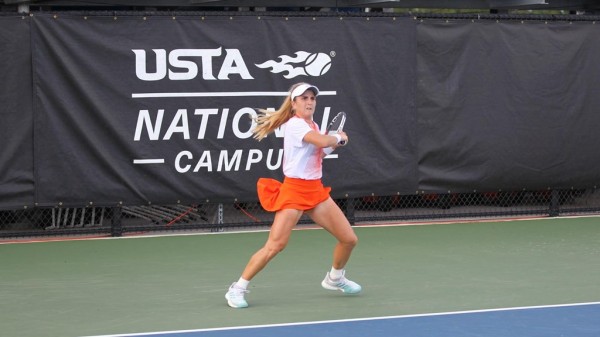By Randy Walker
@TennisPublisher
“Do you know if the winner of this gets a wild card into the U.S. Open?” asked a woman to a friend sitting behind me in the stands of the 2019 NCAA women’s singles final at the USTA National Campus in Orlando, Florida in May. The match was between Kat Jokic of the University of Georgia and Serbia and Estela Perez-Somarriba of the University of Miami and Spain.
“No. They don’t” said the male voice behind me, answering
“I kind of liked when they had that,” said the woman in response.
The male voice went on to explain that the wild cards into the U.S. Open were decided by the U.S. Tennis Association and that they are charged with developing tennis and tennis players in the United States and that there are so many foreign players competing in college tennis that when the win the NCAA titles, they are not awarded the wild card, but when an American player does, they get the wild card. Why should the USTA work to develop a Spanish or Serbian player by giving them a wild card, even if they are the NCAA champion, the male voice explained.
“I’m kind of with you,” said the woman, in agreement.
The winners of the 2019 NCAA singles titles were both non-Americans – Paul Jubb of the University of South Carolina and Great Britain on the men’s side and Perez Somarriba of Miami and Spain. Neither player will be competing at the 2019 U.S. Open.
One idea I thought of and actually later discussed with a University of Miami supporter was a way where you could perhaps continue the long-standing tradition of awarding the NCAA singles championships with U.S. Open wild cards. So, since Jubb, from Great Britain, won the NCAAs, couldn’t Britain’s LTA work a deal with the USTA for a wild card trade? What if Wimbledon gave a wild card to an American player in exchange the USTA giving Jubb a U.S. Open wild card? Since the LTA does not run Wimbledon, you could also trade out wild cards in other British events. Since the first round loser at the U.S. Open earns $50,000, perhaps one U.S. Open wild card equals two or three wild cards into the ATP event at Queen’s Club, where first round losers earn about $18,000 in prize money. Or, it can any other number of combinations of other ATP or WTA events or even on the Challenger or ITF World Tennis Tour level.
In the case of Perez-Somarriba, since she is from Spain, a deal could be made to give her the main draw wild card into the U.S. Open in exchange for the Spanish Federation giving the USTA two main draw wild cards into the Madrid Open, where first-round prize money is $25,000.
One roadblock that could come up in the future is when a player wins the NCAA from a “non-developed” tennis nation that does not have an ATP or WTA event or even a Challenger.
The U.S., French and Australian Opens all have reciprocal wild card agreements amongest each other to award one main draw singles and doubles wild card to each respective nation at their home Grand Slam. (Wimbledon, however, does not participate in this deal but almost every year awards wild cards to deserving non-British players)
Wild cards being dealt around and traded? Sounds appropriate right?
Wild cards and deciding who gets them is a slippery slope. Roger Federer once said that selecting wild cards is like inviting people to a wedding – you have make the cut somewhere and whoever is not selected is going to be upset. This is always the conversation when wild cards are announced for events, particularly the bigger events like the U.S. Open, Wimbledon and the Miami Open. This idea throws another wrinkle into that conversation.

